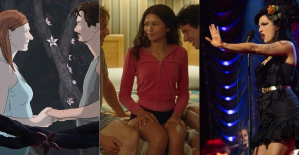This woman definitely needs a room to herself. Virginia Woolf coined this expression as a metaphor par excellence for the intellectually creative, writing woman: Without a room of her own, nothing will come of it.
And that was precisely the problem with the younger colleague of the great English novelist and essayist, Annie Ernaux, who was awarded the Nobel Prize in Literature this year. Such a place of retreat was missing for a long time.
She came to writing late and, as a working wife and mother, felt guilty that she felt this irrepressible urge to dedicate her life to literature.
As if she wanted to certify this torn between family commitments and poetic inclination once and for all through private documents, the 82-year-old has now put together a one-hour film documentation of her family life in the 1970s together with her son. It bears Annie Ernaux's typical laconic title "The Super 8 Years".
In fact, the film permanently shows a woman who does not seem to feel well. You can always see her on the fringes of the action, smiling tormented, blinking tensely. In her few relaxed moments she can look like the then world-famous pop singer Francoise Hardy with her beautiful long straight hair!
By the way, there is never a loving gesture towards her children here either. Her husband, who usually holds the camera, can hardly be seen in these amateur recordings.
Incidentally, the husband is only mentioned without emotion in Annie Ernaux's books and is never described sensitively. She separated from him after 15 years of marriage in the early 1980s. In contrast to Annie Ernaux, he came from a middle-class family, became a lawyer, but apparently died of cancer relatively early.
He seems to have been responsible for the young couple's style of furnishing, because the camera often glides lovingly over the mahogany chests of drawers and the Louis Philippe sofa upholstered in thick velor. Of course, that wasn't to the author's liking either.
Apparently, however, it has prevailed in the choice of travel destinations. For the most part, these Super 8 films document the vacations of the young Ernaux family. The classic domestic destinations of the French bourgeoisie of those years hardly ever exist.
After all, one goes to the Ardèche, above all to experience the simple life in the bosom of nature, in a deserted mountain village without electricity and running water. At that time, many wanted to get out of the “consumption compulsion”. Traveling out of political curiosity was also typical of the era.
The world behind the "Iron Curtain" became interesting at the time, not least because of the global policy of detente. The Ernaux' choose the most unknown country in the entire Eastern bloc and travel to Albania in 1975!
The images are of the expected desolation. Their last trip together as a foursome, with their two sons, even took them to Moscow in the fall of 1981. There is not the slightest trace of perestroika there, but it is probably more the fascination with the socialist reality that drew leftists to the Soviet Union at the time.
Of course, there is not the slightest trace of the wave of disillusionment that set in at least among French intellectuals at the time in the mute and yet very private series of images.
The author's comments, which underlie him, are also silent on politics. As eloquently as Annie Ernaux evoked the sense of departure from 1981 in her books, the year Mitterrand came to power on May 10, “this was our 1936, our parents’ popular front, our liberation from German occupation,” they say in "The Years" - the author remains silent here as far as this caesura is concerned, which swept away Giscard d' Estaing, who was notorious for being arrogant and corrupt.
Yes, "The Super 8 Years" remain strictly private. They are probably aimed primarily at the fans of the Nobel Prize in Literature. And listening to her melancholy, ingratiating, already a little broken-sounding voice for sixty minutes has its own not inconsiderable charm.
But what does the documentation contribute to the understanding of your work? The magna mater of that reckoning literature with its own precarious origin, which lives on in the accusations of Didier Eribon or Edouard Louis (albeit in a far less polished French), this magna mater actually seems just as unhappy in this private setting as in their books.
How about speaking with Gottfried Keller's "Green Heinrich" with a "praise of tradition" for a try? Currently not in business. But it would be nice for a change.

 His body naturally produces alcohol, he is acquitted after a drunk driving conviction
His body naturally produces alcohol, he is acquitted after a drunk driving conviction Who is David Pecker, the first key witness in Donald Trump's trial?
Who is David Pecker, the first key witness in Donald Trump's trial? What does the law on the expulsion of migrants to Rwanda adopted by the British Parliament contain?
What does the law on the expulsion of migrants to Rwanda adopted by the British Parliament contain? The shadow of Chinese espionage hangs over Westminster
The shadow of Chinese espionage hangs over Westminster Colorectal cancer: what to watch out for in those under 50
Colorectal cancer: what to watch out for in those under 50 H5N1 virus: traces detected in pasteurized milk in the United States
H5N1 virus: traces detected in pasteurized milk in the United States What High Blood Pressure Does to Your Body (And Why It Should Be Treated)
What High Blood Pressure Does to Your Body (And Why It Should Be Treated) Vaccination in France has progressed in 2023, rejoices Public Health France
Vaccination in France has progressed in 2023, rejoices Public Health France The right deplores a “dismal agreement” on the end of careers at the SNCF
The right deplores a “dismal agreement” on the end of careers at the SNCF The United States pushes TikTok towards the exit
The United States pushes TikTok towards the exit Air traffic controllers strike: 75% of flights canceled at Orly on Thursday, 65% at Roissy and Marseille
Air traffic controllers strike: 75% of flights canceled at Orly on Thursday, 65% at Roissy and Marseille This is what your pay slip could look like tomorrow according to Bruno Le Maire
This is what your pay slip could look like tomorrow according to Bruno Le Maire Sky Dome 2123, Challengers, Back to Black... Films to watch or avoid this week
Sky Dome 2123, Challengers, Back to Black... Films to watch or avoid this week The standoff between the organizers of Vieilles Charrues and the elected officials of Carhaix threatens the festival
The standoff between the organizers of Vieilles Charrues and the elected officials of Carhaix threatens the festival Strasbourg inaugurates a year of celebrations and debates as World Book Capital
Strasbourg inaugurates a year of celebrations and debates as World Book Capital Kendji Girac is “out of the woods” after his gunshot wound to the chest
Kendji Girac is “out of the woods” after his gunshot wound to the chest Skoda Kodiaq 2024: a 'beast' plug-in hybrid SUV
Skoda Kodiaq 2024: a 'beast' plug-in hybrid SUV Tesla launches a new Model Y with 600 km of autonomy at a "more accessible price"
Tesla launches a new Model Y with 600 km of autonomy at a "more accessible price" The 10 best-selling cars in March 2024 in Spain: sales fall due to Easter
The 10 best-selling cars in March 2024 in Spain: sales fall due to Easter A private jet company buys more than 100 flying cars
A private jet company buys more than 100 flying cars This is how housing prices have changed in Spain in the last decade
This is how housing prices have changed in Spain in the last decade The home mortgage firm drops 10% in January and interest soars to 3.46%
The home mortgage firm drops 10% in January and interest soars to 3.46% The jewel of the Rocío de Nagüeles urbanization: a dream villa in Marbella
The jewel of the Rocío de Nagüeles urbanization: a dream villa in Marbella Rental prices grow by 7.3% in February: where does it go up and where does it go down?
Rental prices grow by 7.3% in February: where does it go up and where does it go down? Europeans: “All those who claim that we don’t need Europe are liars”, criticizes Bayrou
Europeans: “All those who claim that we don’t need Europe are liars”, criticizes Bayrou With the promise of a “real burst of authority”, Gabriel Attal provokes the ire of the opposition
With the promise of a “real burst of authority”, Gabriel Attal provokes the ire of the opposition Europeans: the schedule of debates to follow between now and June 9
Europeans: the schedule of debates to follow between now and June 9 Europeans: “In France, there is a left and there is a right,” assures Bellamy
Europeans: “In France, there is a left and there is a right,” assures Bellamy These French cities that will boycott the World Cup in Qatar
These French cities that will boycott the World Cup in Qatar NBA: the Wolves escape against the Suns, Indiana unfolds and the Clippers defeated
NBA: the Wolves escape against the Suns, Indiana unfolds and the Clippers defeated Real Madrid: what position will Mbappé play? The answer is known
Real Madrid: what position will Mbappé play? The answer is known Cycling: Quintana will appear at the Giro
Cycling: Quintana will appear at the Giro Premier League: “The team has given up”, notes Mauricio Pochettino after Arsenal’s card
Premier League: “The team has given up”, notes Mauricio Pochettino after Arsenal’s card


















